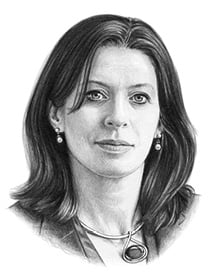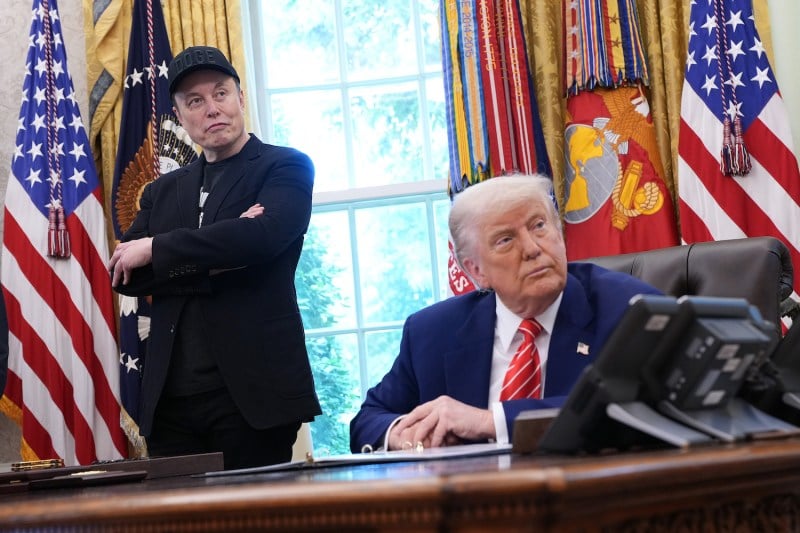What Happens When Leaders Try to Dictate Art?

What Happens When Leaders Try to Dictate Art?
Trump’s absurd Kennedy Center takeover is a dangerous step.
A performance takes place during the 2024 Anti-Defamation League “In Concert Against Hate” at the Kennedy Center Concert Hall in Washington, D.C., on Nov. 18, 2024.
Jemal Countess/Getty Images for Anti-Defamation League
When U.S. President Donald Trump posted on Truth Social, on Feb. 7, that he’d appointed “an amazing Chairman, DONALD J. TRUMP!” to the Kennedy Center, people responded with bafflement and jokes. When the president-cum-Kennedy Center chairman then appointed his loyalist follower Richard Grenell interim executive director and installed a MAGA-inspired board, the bafflement and gallows humor reached new highs.
But Trump’s takeover of a cultural institution should not just be a source of amusement, especially since the president has also promised to change the center’s programming. The moves put him in the company—historic and current—of tyrants, not auteurs.
When U.S. President Donald Trump posted on Truth Social, on Feb. 7, that he’d appointed “an amazing Chairman, DONALD J. TRUMP!” to the Kennedy Center, people responded with bafflement and jokes. When the president-cum-Kennedy Center chairman then appointed his loyalist follower Richard Grenell interim executive director and installed a MAGA-inspired board, the bafflement and gallows humor reached new highs.
But Trump’s takeover of a cultural institution should not just be a source of amusement, especially since the president has also promised to change the center’s programming. The moves put him in the company—historic and current—of tyrants, not auteurs.
Classical music is rarely front-page news, and the move took the Kennedy Center by complete surprise. The cultural center in Foggy Bottom, after all, hosts a leading symphony orchestra and a major opera company and is hardly a center of political fights.
The idea that Trump might be interested in its chairmanship had been on no one’s radar. In fact, so unexpected was the news that music aficionados on social media began asking which symphonies and operas the new chairman—noted for his love of the Andrew Lloyd Webber musical Cats—might decide should be performed there, and whether he might decide to conduct them himself.
The jokes swiftly faded when, a few days later, Trump appointed Grenell the Kennedy Center’s interim executive director. The jokes fell completely silent when, on Feb. 12, the Kennedy Center announced its new trustees, installed to replace trustees fired by Trump. Those now installed on the board of trustees include Vice President J.D. Vance’s wife, Usha; Trump’s chief of staff, Susie Wiles; his deputy chief of staff, Dan Scavino; White House Presidential Personnel Director Sergio Gor; and Allison Lutnick, the wife of Trump’s secretary of commerce nominee, Howard Lutnick.
To be sure, the Kennedy Center’s board has always included a bipartisan political element; Democrats and Republicans have traditionally nominated half the board each. But this is different. Now every board member belongs to the Trump camp. The reconstituted board. “President Donald J. Trump was just unanimously elected Chairman of the Board of the prestigious Kennedy Center in Washington, D.C. The President stated, ‘It is a Great Honor to be Chairman of The Kennedy Center, especially with this amazing Board of Trustees. We will make The Kennedy Center a very special and exciting place!’” he posted on Feb. 12.
This is a president who despises (or perhaps doesn’t know) high culture taking over a famed cultural center. And it’s not a silly game. In announcing his own appointment as chairman, Trump vowed the programming was going to change. He had heard about drag shows at the center. As a regular visitor there, I recall only countless opera performances and symphony concerts, as well as a lot of jazz and folk in the foyer, though the center has hosted the occasional drag event. Either way, Trump announced that “THIS WILL STOP. The Kennedy Center is an American Jewel, and must reflect the brightest STARS on its stage from all across our Nation. For the Kennedy Center, THE BEST IS YET TO COME!”
I’d hate to be alarmist, but the president of the United States is invoking the language of a certain German regime that, in the 1930s, banned what it labeled “Entartete Kunst,” degenerate art. The Nazis wanted German culture organized neatly under the government’s control. Soon after taking power, this regime made its preferences known to Germany’s myriad publicly funded theaters, opera houses, and concert halls. It also created the Reichskulturkammer (Reich Chamber of Culture), under which culture in Germany would operate; Joseph Goebbels was appointed the chamber’s president.
Soon German culture—for so long the envy of the world—became more and more constrained as practitioners and artistic products, especially books, were banned, while other practitioners, from conductors to painters, engaged in self-censorship or left the country. That’s how Thomas Mann ended up in Pacific Palisades. In his novel Mephisto, Klaus Mann—Thomas’s son—masterfully portrays the careerists who thrive in autocracies, while talent withers.
And the urge to control culture didn’t die with Goebbels and his ilk. Wanting to control culture is, in fact, the hallmark of authoritarian regimes. The Cold War was characterized by Eastern Bloc regimes’ attempts to govern all culture and, in the process, ensure that undesirable expressions of it were weeded out. Every novel Aleksandr Solzhenitsyn wrote was at immediate risk of being banned, and the Russian author constantly faced the risk of imprisonment. In Czechoslovakia, Vaclav Havel was kept under constant surveillance and denied jobs worthy of his talent. The artists the regimes deemed acceptable, by contrast, were well-looked-after by the respective countries’ cultural organizations. Untold numbers of artists less known than Solzhenitsyn and Havel suffered the same fate.
Today, Venezuelan President Nicolás Maduro continues this tradition. Until recently, countries around the world sought to emulate Venezuela’s El Sistema, a government-funded program that teaches scores of children to play instruments at a level previously thought unachievable. Not only have hundreds of Venezuelan children grown up to play in El Sistema’s many symphony orchestras, including the world-class National Children’s Symphony of Venezuela and Simón Bolívar Symphony Orchestra; many of the musicians have also been appointed to the world’s very best orchestras. The double-bass player Edicson Ruiz was hired by the Berlin Philharmonic, considered the world’s best symphony orchestra, while still in his teens. Listen to him here.
But Maduro couldn’t resist the urge to control the program. Now El Sistema is fraying, the inevitable result of political encroachment that has seen Maduro install his vice president and his son on El Sistema’s board and try to use El Sistema for propaganda purposes abroad. In 2017, after El Sistema’s most celebrated graduate, the conductor Gustavo Dudamel, wrote an op-ed voicing criticism against the regime’s brutal crackdown of pro-democracy protesters, Maduro canceled a planned U.S. tour by Dudamel and the National Children’s Symphony of Venezuela. Many El Sistema musicians in their late teens or early 20s have now found conservatory places or jobs abroad or are trying to do so.
On the other side of the spectrum are the political leaders who are passionate about the arts but would never dream of politicizing them, precisely because they understand that the arts will languish if put under political control. Helmut Schmidt, West Germany’s chancellor in the late ’70s and early ’80s, was a concert-level pianist. (Hear him play Mozart here.) If he’d decided he wanted to become chairman of the Berlin Philharmonic, it would have made a lot of sense. But he didn’t, because he knew that arts thrive only when separated from politics.
Trump has never considered himself an arts lover; indeed, he recently told a reporter on board Air Force One that he’s never attended a performance at the Kennedy Center. Even so, for the purported sake of protecting the arts, he’s putting himself in the company of Maduro, the Soviets, the Czechoslovak rulers, and Goebbels.
This post is part of FP’s ongoing coverage of the Trump administration. Follow along here.
Elisabeth Braw is a columnist at Foreign Policy, a senior fellow at the Atlantic Council, and the author of “Goodbye Globalization.” X: @elisabethbraw
More from Foreign Policy
-

Russian President Vladimir Putin looks on during a press conference after meeting with French President in Moscow, on February 7, 2022. The Domino Theory Is Coming for Putin
A series of setbacks for Russia is only gaining momentum.
-

The container ship Gunde Maersk sits docked at the Port of Oakland on June 24, 2024 in Oakland, California. How Denmark Can Hit Back Against Trump on Greenland
The White House is threatening a close ally with a trade war or worse—but Copenhagen has leverage that could inflict instant pain on the U.S. economy.
-

Donald Trump speaks during an event commemorating the 400th Anniversary of the First Representative Legislative Assembly in Jamestown, Virginia on July 30, 2019. This Could Be ‘Peak Trump’
His return to power has been impressive—but the hard work is about to begin.
-

US Secretary of State Marco Rubio greets employees at the State Department in Washington, DC, on January 21, 2025. The National Security Establishment Needs Working-Class Americans
President Trump has an opportunity to unleash underutilized talent in tackling dangers at home and abroad.









Join the Conversation
Commenting on this and other recent articles is just one benefit of a Foreign Policy subscription.
Already a subscriber?
.
Subscribe
Subscribe
View Comments
Join the Conversation
Join the conversation on this and other recent Foreign Policy articles when you subscribe now.
Subscribe
Subscribe
Not your account?
View Comments
Join the Conversation
Please follow our comment guidelines, stay on topic, and be civil, courteous, and respectful of others’ beliefs.
Change your username |
Log out
Change your username:
CANCEL
Confirm your username to get started.
The default username below has been generated using the first name and last initial on your FP subscriber account. Usernames may be updated at any time and must not contain inappropriate or offensive language.